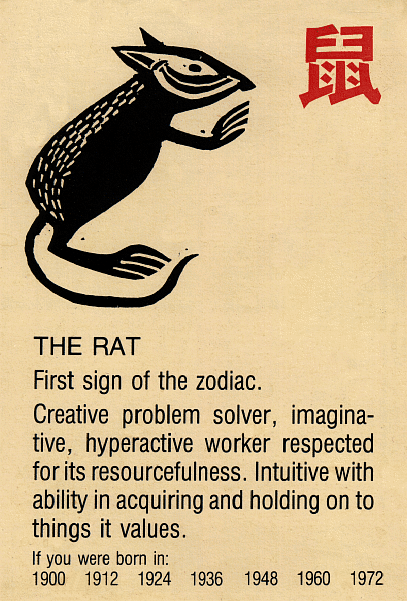

2008 is the Year of the Rat,
which is also known by its former name of Wu Zhi.
February 7, 2008 is the first day of the Chinese new year.
Year of the Rat
Rats are said to be imaginative, charming and very generous to those they love - although they do have a tendency to be quick-tempered and over-critical. They are supposed to make good writers, critics and publicists.
Famous people born in the Year Of The Rat:
Ron Moody, Marlon Brando, Burt Reynolds,Ursula Andress, Englebert Humperdinck
The Chinese Lunar New Year is the longest chronological record in history, dating from 2600BC, when the Emperor Huang Ti introduced the first cycle of the zodiac. Like the Western calendar, The Chinese Lunar Calendar is a yearly one, with the start of the lunar year being based on the cycles of the moon. Therefore, because of this cyclical dating, the beginning of the year can fall anywhere between late January and the middle of February. This year it falls on February 12th. A complete cycle takes 60 years and is made up of five cycles of 12 years each.
The Chinese Lunar Calendar names each of the twelve years after an animal. Legend has it that the Lord Buddha summoned all the animals to come to him before he departed from earth. Only twelve came to bid him farewell and as a reward he named a year after each one in the order they arrived. The Chinese believe the animal ruling the year in which a person is born has a profound influence on personality, saying: "This is the animal that hides in your heart."
Click image to enlarge
# Names of month in Islamic lunar calendar
The names of the lunar months are: Maharrem, Safar, Rabi' Al-Awwal, Rabi' Al-Akhar, Jamada Al-Akhirah, Rajab, Sha'ban, Ramadhan, Shawwal, Zul-Qi'dah, and Zul-Hijjah.
# Names of months in English-speaking countries
In English, the names of the 12 months are:
January, February, March, April, May, June, July, August, September, October, November, December.
# Chinese, Japanese, and Korean Zodiac
The 12 animals of the Chinese calendar are widely adopted and used in Chinese, Japanese and Korean Zodiacs.
# Vietnamese Zodiac
The Vietnamese adopts the 12 animals of the Chinese calendar, with the exception of the 4-th animal. The rabbit is replaced by the cat.
Ty', Su*?u, Da^`n, Me.o, Thi`n, Ti., Ngo. , Mu`i, Tha^n, Da^.u, Tua^'t , Ho*.i
History
Chinese New Year
The Chinese New Year has a great history. In other traditions, by this time in the year, most resolutions - made on December 31 - have been subtly forgotten and placed in a cupboard marked "maybe next year." However, all hope is not lost, as there's a second chance to start afresh with the celebration of Chinese New Year on February 12th.
The Chinese New Year is very similar to the Western one, swathed in traditions and rituals.
The origin of the Chinese New Year is itself centuries old - in fact, too old to actually be traced. It is popularly recognised as the Spring Festival and celebrations last 15 days.
Preparations tend to begin a month from the date of the Chinese New Year (similar to a Western Christmas), when people start buying presents, decoration materials, food and clothing. A huge clean-up gets underway days before the New Year, when Chinese houses are cleaned from top to bottom, to sweep away any traces of bad luck, and doors and windowpanes are given a new coat of paint, usually red. The doors and windows are then decorated with paper cuts and couplets with themes such as happiness, wealth and longevity printed on them.
The eve of the New Year is perhaps the most exciting part of the event, as anticipation creeps in. Here, traditions and rituals are very carefully observed in everything from food to clothing. Dinner is usually a feast of seafood and dumplings, signifying different good wishes. Delicacies include prawns, for liveliness and happiness, dried oysters (or ho xi), for all things good, raw fish salad or yu sheng to bring good luck and prosperity, Fai-hai (Angel Hair), an edible hair-like seaweed to bring prosperity, and dumplings boiled in water (Jiaozi) signifying a long-lost good wish for a family. It's usual to wear something red as this colour is meant to ward off evil spirits - but black and white are out, as these are associated with mourning. After dinner, the family sit up for the night playing cards, board games or watching TV programmes dedicated to the occasion. At midnight, the sky is lit up by fireworks.
On the day itself, an ancient custom called Hong Bao, meaning Red Packet, takes place. This involves married couples giving children and unmarried adults money in red envelopes. Then the family begins to say greetings from door to door, first to their relatives and then their neighbours. Like the Western saying "let bygones be bygones," at Chinese New Year, grudges are very easily cast aside.
The end of the New Year is marked by the Festival of Lanterns, which is a celebration with singing, dancing and lantern shows.
Although celebrations of the Chinese New Year vary, the underlying message is one of peace and happiness for family members and friends.
For monthly calendar of 2008 (designed by Mr. Meng Zhuo of CWR Univ.) 2008 Jan | Feb | Mar | Apr | May | Jun | Jul | Aug | Sep | Oct | Nov | Dec
See for LunarCal - A Perpetual Chinese Lunar Calendar
This site requires Quick time to play its audio player if need.
----------------------------------------------
"A penny for your thoughts"
----------------------------------------------
"A penny for your thoughts"
You are here: Home > Reality > Chinese New Year
Wednesday, January 2, 2008
Chinese New Year
I'm reading: Chinese New YearTweet this!
Posted by
BigCloud
at
11:25 AM

Labels: Reality | Hotlinks: DiggIt! Del.icio.us
Subscribe to:
Post Comments (Atom)







0 Comments:
Post a Comment